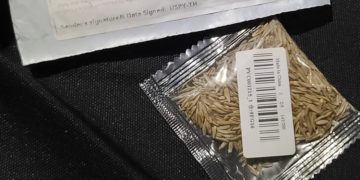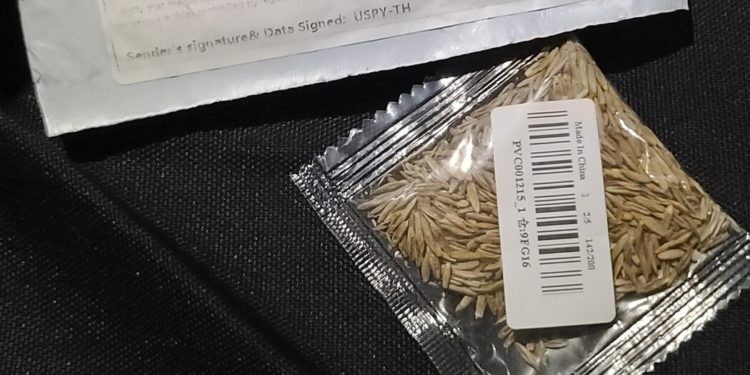People in Alabama, Texas and New Mexico have reported receiving seeds in packages apparently sent from China, prompting officials in those states to warn residents not to plant them because the seeds could sprout into invasive plants.
Unsolicited seed packets also arrived in mailboxes in many states in 2020, when the U.S. Department of Agriculture received thousands of reports of Americans receiving seeds in packages with Chinese characters.
Federal investigators said the evidence indicated the packages sent in 2020 were part of a “brushing scam” in which sellers mail inexpensive items to unsuspecting recipients and then post bogus customer reviews to boost online ratings and sales. There was no evidence the seeds were intended to harm American agriculture, officials said at the time.
In recent months, seed packages have arrived in Alabama, Texas and New Mexico, according to officials in those states.
The Texas Department of Agriculture said this month that it had collected 311 unsolicited seed packages from 64 locations, including the first instance of a live plant being mailed unsolicited to a Texas resident. The packages appeared to have come from China, based on their postmarks and Chinese characters on the packaging, according to Sid Miller, the Texas agriculture commissioner. They contained seeds for vegetables, weeds, grasses and at least one invasive aquatic plant, he said.
While it was unclear whether the seeds were part of another brushing scam, the circumstances appeared to be similar to 2020, the Texas Agriculture Department said in a statement. Residents who receive unsolicited seeds should keep them sealed in their original packaging and contact agricultural officials, Mr. Miller said.
“We must stay vigilant and not assume that every package contains harmless plant material,” Mr. Miller said in a statement. “Although many of these seeds are not listed as noxious plants by the federal government, they still pose a significant national biosecurity threat that should not be overlooked.”
The Alabama Department of Agriculture and Industries has received six reports of unsolicited seeds arriving in the mail, a spokeswoman said on Monday. Some of the packages also appeared to have come from China, including at least one that said “Made in China” on the pouch that contained the seeds. The seeds were identified as tomato and onion seeds and tested negative for harmful compounds, the department said.
“We urge all residents to be on the lookout for similar packages,” Rick Pate, Alabama’s commissioner of agriculture and industries, said in a statement. “These seeds may be invasive to Alabama plants or be harmful to livestock.”
A spokeswoman for the New Mexico Department of Agriculture said it had received one report of a resident receiving a packet of unsolicited seeds.
“These unauthorized seed shipments violate state and federal law and pose serious risks to our agriculture and environment,” Katie Laney, a New Mexico agricultural official, said in a statement. “Unknown seeds could introduce invasive species or plant diseases that threaten New Mexico’s ecosystems and farming communities.”
In 2020, federal investigators said that at least 14 of the seed varieties that were mailed to unsuspecting residents had been identified as a “mix of ornamental fruit and vegetable, herb and weed species.”
Among the plant species botanists identified were cabbage, hibiscus, lavender, mint, morning glory, mustard, rose, rosemary and sage, according to the U.S. Department of Agriculture Animal and Plant Health Inspection Service.
“It was nothing nefarious,” Osama El-Lissy, a former deputy administrator of the Animal and Plant Health Inspection Service, who was involved in tracking the seed packages in 2020, said in an interview on Monday. “It was more of a business gimmick.”
Still, Mr. El-Lissy said, the seeds posed a concern because they could have carried invasive pests — a point other experts also emphasized with the latest round of mysterious seeds.
“It’s hard to know the real intent behind the seed packets, but in the past these have been tied to scams,” said David L. Ortega, an expert in agricultural economics and food policy at Michigan State University.
People who receive the packages should be cautious but not alarmed, he said. “The biggest thing is don’t plant them — and contact your local or state-level agriculture office and let them be aware,” Dr. Ortega said.
Michael Levenson covers breaking news for The Times from New York. More about Michael Levenson
The post 3 States Issue Warnings About Unsolicited Packages of Seeds appeared first on New York Times.



















